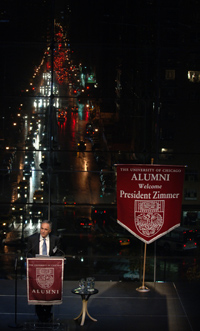|
||
      |
Changing of the guard
Robert J. Zimmer’s presidential installation celebrated Chicago’s values and community.

At one of several regional events, Zimmer spoke at New York’s
Lincoln Center.
The 487th Convocation, held October 27 in Rockefeller Memorial Chapel, marked a homecoming: President Robert J. Zimmer, a Brandeis- and Harvard-educated mathematician, spent 25 years at Chicago before joining Brown University as provost and Ford Foundation professor of mathematics in 2002.
The presidential inauguration, noted University Marshal Lorna P. Straus, SM’60, PhD’62, followed a pattern established by Chicago’s founding president, William Rainey Harper: like the first convocation, held in January 1893, it was an occasion to grant degrees, to look forward to “the opportunities and necessities of the future,” and to come together as a community.
The community that crowded the chapel included three past presidents—Hanna H. Gray, Hugo F. Sonnenschein, and Don M. Randel—as well as trustees, faculty, and alumni. They were joined by delegates from 82 colleges and universities (from the University of Oxford, founded in 1096, to the University of San Pablo–Ceu, founded in 1993) and 19 learned societies and educational organizations. Other staff, students, and friends watched by video or Webcast. All heard the new president consider future opportunities and necessities through the lens of an institution with one essential value: “a singular focus on inquiry.” (For the full text of the address, see “Onward, Inquiry.”)
Following tradition, Zimmer conferred honorary degrees upon seven distinguished scholars: Sandra M. Faber, University professor and chair of the Department of Astronomy & Astrophysics at the University of California, Santa Cruz, received a Doctor of Science degree for her work on galaxy formation and evolution. Michael Fried, the James R. Herbert Boone professor of humanities and art history at Johns Hopkins University, was awarded a Doctor of Humane Letters degree; Fried’s readings of art, from 17th-century painting through contemporary photography, show its power to provide a history of human sensibility.
Zimmer embraced the next ScD recipient—his old friend Alex Lubotzky, professor of mathematics at Hebrew University of Jerusalem, whose theoretical work on discrete groups relates abstract mathematics to concrete applications such as designing computer chips and telephone networks. Hazel Markus, Stanford University’s Davis Brack professor in behavioral sciences, also received an honorary ScD, recognizing her contributions to social and cultural psychology. Harm Pinkster, professor of Latin at the University of Amsterdam and the world’s leading authority on Latin linguistics, was awarded a Doctorate of Human Letters.
Allan C. Spradling, SB’71, a Howard Hughes Medical Institute investigator and director of the Carnegie Institution of Washington’s Department of Embryology, received an honorary ScD for his contributions to developmental biology. The final recipient was Karen B. Strier, the Hilldale professor of anthropology at the University of Wisconsin–Madison, who was awarded an honorary ScD for her research on monkeys in Brazil’s Atlantic forest, work that has offered insights into the social behavioral evolution of humans and other primates.
The awarding of degrees concluded with the triumphant strains of Brahms’s Academic Festival Overture, Op. 80, performed by the Motet and University Chapel choirs and members of the University orchestra: “Vivat academia, vivant professores!”
Then representatives of Chicago’s faculty, students, and alumni welcomed the president. Speaking for the faculty, Robert B. Pippen—the Evelyn Stefansson Nef distinguished service professor in the Committee on Social Thought, philosophy, and the College, and chair of the faculty advisory committee during the presidential search—confessed to a peculiarly Chicago concern. It is a place, he said, where “almost everyone worries almost all the time that everything of value that the University represents is in great imminent danger of being lost or permanently forgotten.” In such a context, he continued, it was heartening that the search committee found “someone who understands and shares and can articulate and defend these values. It is a great reassuring bonus when that person is also one of our own, already a trusted member of the family.”
Family spirit held sway as the audience joined in singing the Alma Mater. Dean of the Chapel Alison Boden offered a benediction, and the recessional, a colorful mosaic of academic finery, paraded past. The Laura Spelman Rockefeller carillon sounded a swinging peal, and the celebration continued with a lunch for the honorary-degree recipients in Bartlett Dining Commons and an afternoon party (see “Lite of the Mind”) on the Main Quadrangle.